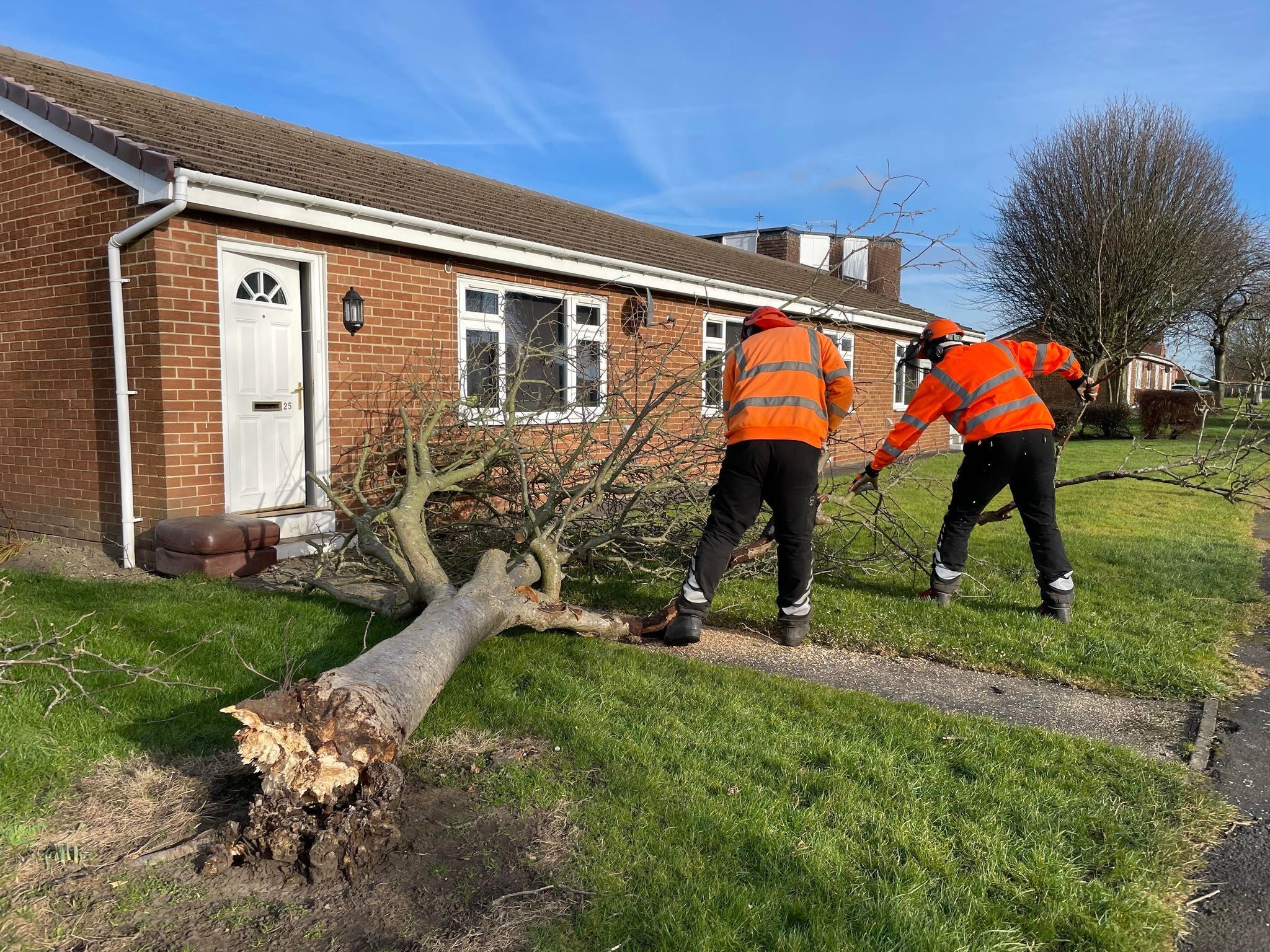Back-to-back storms with gusts above 90mph batter parts of UK
Thousands of people still have no power and schools will be shut on Monday.

Schools will be shut and thousands of people are without power after back to back storms battered parts of the UK.
A cold and blustery start to Monday follows a stormy weekend of devastating winds across the north of England and Scotland.
A nine-year-old boy in Staffordshire and a 60-year-old woman in Aberdeen died after trees were torn down during Storm Malik on Saturday.
Storm Corrie hit a day later and its gusts are set to slowly move away on Monday morning.
The strongest gust during Storm Malik was 93mph in Brizlee Wood, Northumberland, on Saturday morning but there were also winds that hit 80mph over wide areas of Scotland, and 70mph in the north of England throughout the day.
Met Office meteorologist Alex Burkill said: “That is exceptionally strong for any time of the year and there is no wonder there were significant impacts such as power outages and damage to buildings. It is very unfortunate that things were worse than that for some people.”
Several schools in Aberdeenshire said they will be shut or delay opening on Monday as they struggled with power and heating problems.
Storm Corrie moved eastwards across Scotland on Sunday and is set to push across the North Sea in the early hours of Monday.
Winds of 92mph were recorded in Stornoway, on the Western Isles, as Storm Corrie began to hit the UK on Sunday night.
Scotland’s First Minister Nicola Sturgeon said the impact of Storm Corrie is “likely to be significant”.
She tweeted on Sunday: “Work to repair the damage from Storm Malik continues. Tens of thousands have had power reconnected already – however, many will remain off supply again tonight and some, especially in north east, could be off into Tuesday. Welfare arrangements are in place.
“Special arrangements remain in place for vulnerable customers and local resilience partnerships continue to work with councils to provide welfare support.”
Strong winds are expected until the early hours of Monday and they may affect parts of Norfolk where large waves could hit the coast.
Weather warnings for wind across northern parts of Scotland are in force.
Forecasters said that people should beware of flying debris that could lead to injuries, and there may be some damage to buildings including tiles being blown from roofs.
Mr Burkill said: “It is not just the case of strong winds causing problems – there is also the ice risk across parts of Scotland through to the early part of Monday morning.
“There will be some wintry showers. Emergency services are trying to get out, utility companies are trying to make repairs and so the icy conditions are not going to make that easier for them.”
Ice warnings were issued by the Met Office covering Grampian, Highlands and Eilean Siar, Strathclyde and Fife on Monday as falling temperatures after Storm Corrie may see some snowfall and turn untreated surfaces icy.
Hospitality worker Clare Stirling-Turnbull, 47, of Powburn, Northumberland, has been without heating and electricity since 9am on Saturday.
To make matters worse, one of the children in her family of six has Covid and is currently isolating.
She said: “So we can’t go to relatives’ houses… we have no electric, no heating or hot water – we do have a wood burner so can heat one room.”
The family were “well prepared” thanks to a gas barbeque, candle and hot water bottles, she said.
Northern Powergrid said that around 80,000 customers, almost all in Northumberland and County Durham, had been affected by power cuts.
Director Paul Glendinning said: “Given what we now know, we expect that around 4,000 customers will still be off supply as we go into tomorrow (Monday). We have confirmed that there is around 200 damage points on the low voltage network that will reconnect only a small number of customers for each repair.”
Some 7,500 households are expected to be without power by the end of Sunday, the Scottish Government said in an update at 7pm on Sunday.
Deputy First Minister John Swinney said: “The power companies have drafted in a large number of additional engineers and are making significant inroads into reconnecting customers.
“However, we need to be aware that the arrival of Storm Corrie could hamper these efforts and add further problems.
“For those who will unfortunately not have power tonight, support with alternative accommodation is available to anyone who needs it.”
Richard Gough, of Scottish and Southern Electricity Networks (SSEN), said “we expect the full restoration of customer supplies from both storms to extend into the early part of next week”.
Rural Aberdeenshire is among the hardest-hit areas and some customers in Angus, the Highlands, the Moray coast and Perthshire were still waiting for supplies to be restored.
Durham County Council, which offered free hot food and drinks to households who were without power, had teams out clearing blocked roads, footpaths and debris.
ScotRail said it withdrew all of its services on Sunday night in an effort to “protect passengers and railway staff”.
Network Rail Scotland, which said that “all parts of the railway are working together”, added that any other trains that ran on Sunday night had a maximum speed of 40mph.